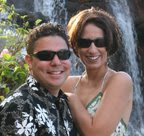From their website:
What is Neurofeedback?
Neurofeedback exercises the mind and strengthens healthy brain function with visual and auditory rewards. At the Neurofeedback Centers for Success a staff of specially trained clinicians administer non-invasive neurofeedback brain training that eases stress and enhances cognitive performance.
Neurofeedback is an exercise for the brain that can be compared to a workout at the gym. It improves the brain’s ability to self-regulate and encourages greater control over functions including concentration and mood. Sometimes our nervous systems interfere with self-regulation with the result being headaches, panic attacks, extreme anger, etc. Strengthening the brain’s self-regulation is a drug free method of overcoming these interferences.Yesterday, my husband, Bill and I, took John for the evaluation and first session. We were a bit apprehensive before arriving. Once we got there, John sat in front of a computer monitor that had imagery that was similar to a "PacMan" video game. The "pacman" rotated in a square formation, moving into the center, eating a series of small yellow dots and then larger red ones. John would giggle when the "pacman" ate the red bubbles. It made a funny noise and he thought it was great. They soon gave him a stuffed lion that was attached to the computer and would vibrate when the 'pacman' ate the red bubbles. John thought this was cool.
While he was watching the video game, he was hooked up through an EEG, which measured his brain waves. We could see them on the monitor next to the video game. We could see through the visual images of his brain that he was more often than not in the "drowsy" level of brain activity. His constant movement was his brain's way of attempting to keep himself awake. Every movement he made, showed1 that he "overused" his energy, sending him over to the "overaroused" section of brain activity. The technician would set levels that John needed to maintain. When his brain activity went out of these levels, the video game would stop, encouraging his brain to come back within the set levels and then the game would continue.
It was actually very interesting to watch. John sat attentive to the game for 1 hour! He got fidgety, asked to go to the bathroom once (which we proceeded to stop the session and take him), needed food for more energy, and became tired at times. About five minutes before it was to end, he told us he was "all done". Watching him over the last few weeks, I would have told you that "all done" would have come much sooner than it did. It was very interesting watching how he responded.
The technician then told us to monitor him, for the next few days to see how he responds to the feedback and brain exercise. So, I took notes.
Here were our observations for the first day:
- We got in the car and he slept for 15 minutes on the way home
- He got home and ate lunch
- He then went and laid down with Bill and slept deeply for 2 hours!
- He was alert and in a good mood for the rest of the afternoon and evening
- We visited my grandpa at the hospital, where he got fidgeting and Bill needed to take him for a walk
- We went out to dinner, where he sat and ate a good meal
- Bedtime routine seemed normal, getting out of bed a few times before falling asleep
- About 2 hours after he fell asleep, he woke up crying for what seemed like no reason
- I couldn't console him in his bedroom, so I rocked him back to sleep
- He then stayed down for the night
The package we received includes 10 sessions. The company states that to make the brain training permanent, they recommend 50 sessions. This week, John will have 3 sessions. I don't know if we will want to continue it past the 10 free ones we get or not. Even if we did, the cost is significant.
At this point, I'm intrigued by it, but I don't know how I feel about it beyond that. My pediatrician says that the medical field doesn't stand by or against the feedback, but said that a lot of people "swear by it". We'll have to see. If John could train his brain to self regulate, I do believe many of his symptoms would disappear. But can this kind of feedback truly train our brains?




No comments:
Post a Comment